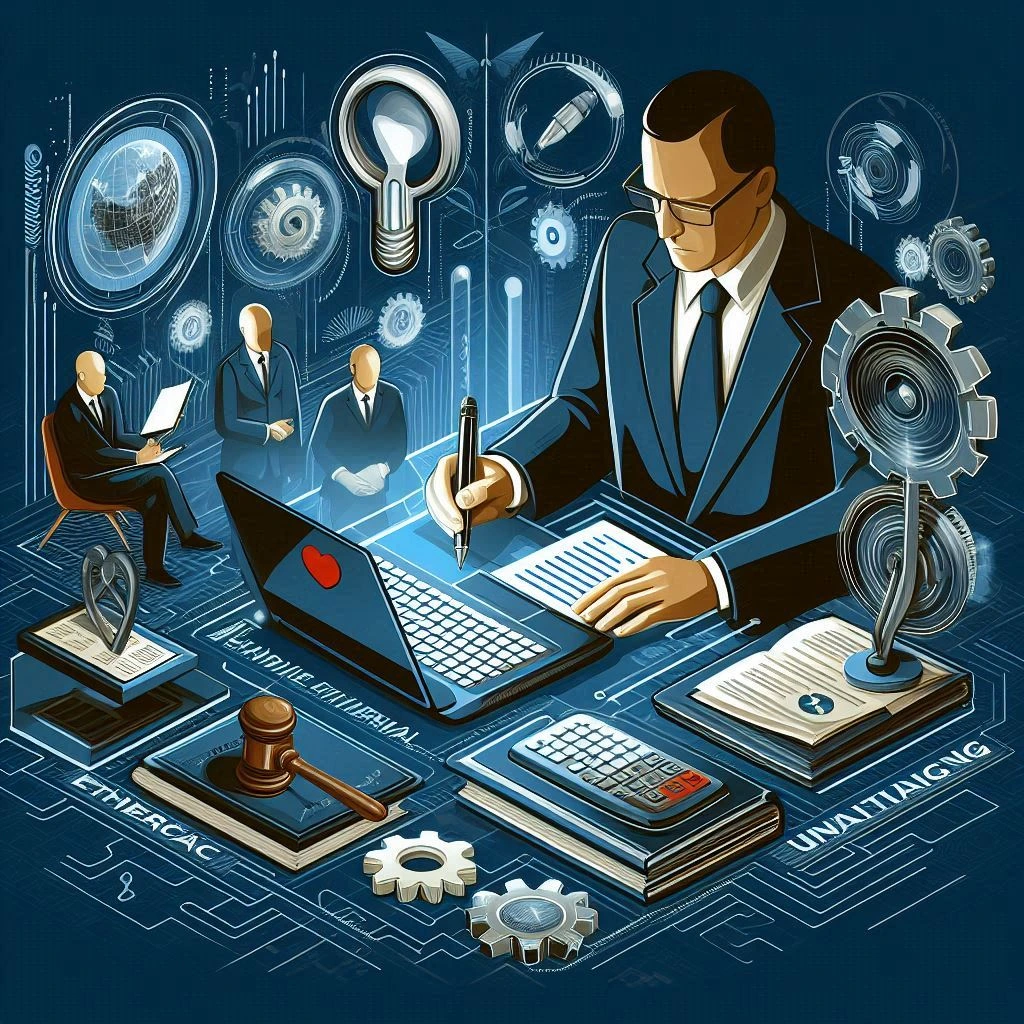Conducting an internal audit remotely has become increasingly common in the modern workforce. Internal auditing plays a crucial role in ensuring the integrity and efficiency of an organization’s operations. It involves a systematic evaluation of financial and operational processes to identify risks, ensure compliance with regulations, and enhance overall governance. The importance of internal auditing cannot be overstated, as it provides stakeholders with assurance regarding the accuracy of financial reporting and the effectiveness of internal controls.
With the advent of the COVID-19 pandemic, many organizations have transitioned to remote work, leading to a significant rise in remote internal auditing practices. This shift has been driven by the need for flexibility and the ability to maintain audit functions despite physical distancing requirements. Remote internal auditing leverages technology to conduct audits from various locations, allowing auditors to access data and collaborate with teams without being physically present. This evolution has transformed traditional auditing methods and introduced new dynamics to the auditing process.
As remote internal auditing becomes more prevalent, it is essential to consider the ethical implications that accompany this shift. Ethics in auditing refers to the moral principles that guide auditors in their professional conduct, ensuring that they act with integrity, objectivity, and confidentiality. The remote environment presents unique challenges that can impact ethical behavior, such as maintaining independence, managing conflicts of interest, and ensuring the security of sensitive information. Understanding these ethical considerations is vital for internal auditors and ethics officers as they navigate the complexities of remote auditing and strive to uphold the highest standards of professional conduct.
The rise of remote internal auditing necessitates a thorough examination of the ethical challenges that auditors may face. By addressing these issues, organizations can foster a culture of ethical behavior and ensure that their auditing practices remain robust and trustworthy in a changing landscape.
The Ethical Framework for Auditors
In the evolving landscape of internal auditing, particularly in remote environments, ethical considerations have become increasingly paramount. Internal auditors and ethics officers must navigate a complex web of ethical principles that guide their practices. This section will explore the foundational ethical principles that underpin the auditing profession and how they manifest in remote audit contexts.
Key Ethical Principles
- Integrity: Integrity is the cornerstone of the auditing profession. Auditors must be honest and forthright in their reporting and interactions. This principle ensures that auditors maintain trust with stakeholders, which is crucial, especially when working remotely where face-to-face interactions are limited [1].
- Objectivity: Objectivity requires auditors to remain impartial and free from conflicts of interest. In a remote setting, the challenge lies in maintaining this objectivity when personal biases or external pressures may influence judgment. Auditors must be vigilant in recognizing and mitigating any potential conflicts that could arise from remote work dynamics [9].
- Confidentiality: The principle of confidentiality obligates auditors to protect sensitive information obtained during the audit process. In remote audits, the risk of data breaches or unauthorized access increases, necessitating robust data protection measures. Auditors must ensure that they are using secure communication channels and safeguarding client data effectively [8][11].
- Professional Behavior: Auditors are expected to comply with relevant laws and regulations and avoid any conduct that discredits the profession. In a remote environment, maintaining professionalism can be challenging due to the informal nature of virtual interactions. Auditors must strive to uphold professional standards, even when working from home or in less formal settings [9].
Importance of Adherence to Professional Standards and Codes of Ethics
Adhering to professional standards and codes of ethics is crucial for internal auditors, as these guidelines provide a framework for ethical decision-making and behavior. The International Internal Audit Standards and various professional organizations outline these standards, emphasizing the importance of ethical conduct in maintaining the credibility and effectiveness of the audit function. In remote auditing, the adherence to these standards becomes even more critical, as the lack of physical oversight can lead to ethical lapses if not carefully managed [1][10].
Application of Ethical Principles in a Remote Context
The transition to remote auditing presents unique challenges in applying these ethical principles. For instance:
- Integrity and Objectivity: Auditors must be proactive in creating an environment that fosters integrity and objectivity, even when working remotely. This may involve regular check-ins with team members and stakeholders to ensure transparency and accountability.
- Confidentiality: With the increased reliance on digital tools, auditors must be vigilant about data security. Implementing strong cybersecurity measures and training staff on data protection protocols are essential steps to uphold confidentiality in a remote setting [8][11].
- Professional Behavior: Maintaining professionalism in virtual meetings and communications is vital. Auditors should establish clear guidelines for remote interactions to ensure that professional standards are upheld, regardless of the physical location [9].
The ethical framework for internal auditors remains a critical component of the profession, particularly in remote environments. By understanding and applying these foundational ethical principles, auditors can navigate the complexities of remote auditing while maintaining the integrity and trust that are essential to their role.
Challenges of Remote Internal Auditing
As organizations increasingly adopt remote work environments, internal auditors face a unique set of ethical challenges that can impact the integrity and effectiveness of their audits. Here are some key considerations:
- Technological Limitations and Digital Divide Issues: The shift to remote auditing has highlighted significant technological challenges. Not all auditors or clients may have access to the necessary tools or reliable internet connections, which can hinder the audit process. This digital divide can lead to disparities in the quality of audits conducted, potentially affecting the overall outcomes and ethical standards upheld during the auditing process [2][14].
- Maintaining Confidentiality and Data Security: Remote auditing raises significant concerns regarding confidentiality and data security. Auditors must ensure that sensitive information is protected while being accessed and shared over digital platforms. The risk of data breaches increases in remote settings, necessitating robust security measures to safeguard client information and maintain trust [5][10].
- Challenges in Communication and Collaboration: Effective communication and collaboration are crucial for successful audits. In a remote environment, auditors may struggle to establish rapport with clients and team members, which can lead to misunderstandings and misinterpretations of information. The lack of face-to-face interaction can also hinder the ability to gauge non-verbal cues, which are often essential in building trust and ensuring clarity in discussions [12].
- Potential for Compromised Objectivity and Independence: Maintaining objectivity and independence is a cornerstone of ethical auditing practices. However, remote environments can create pressures that may compromise these principles. Auditors might face challenges in remaining impartial when working closely with clients in a virtual setting, where the boundaries between professional and personal relationships can blur. This situation can lead to conflicts of interest or perceived biases, undermining the credibility of the audit process [6][10].
While remote internal auditing offers flexibility and efficiency, it also presents significant ethical challenges that auditors must navigate. Addressing these issues is essential for maintaining the integrity of the auditing profession and ensuring that ethical standards are upheld in a rapidly evolving work environment.
Ethical Implications of Remote Tools and Technologies
As the landscape of internal auditing evolves with the integration of remote tools and technologies, it is crucial to address the ethical implications that accompany these advancements. Internal auditors and ethics officers must navigate a complex array of challenges to ensure that the integrity of the audit process is maintained. Here are some key ethical considerations:
- Risks of Using Cloud-Based Platforms for Data Storage and Sharing: The adoption of cloud-based platforms for storing and sharing sensitive audit data raises significant ethical concerns. These platforms can be vulnerable to data breaches, unauthorized access, and loss of data integrity. Auditors must ensure that robust security measures are in place to protect confidential information and comply with data privacy regulations. The potential for algorithmic bias in cloud services also poses a risk, as it can lead to unfair treatment of data or misinterpretation of audit findings, which can compromise the audit’s credibility [1][2].
- Ethical Considerations in Using Automation and AI in the Audit Process: The increasing reliance on automation and artificial intelligence (AI) in auditing introduces ethical dilemmas related to transparency and accountability. While these technologies can enhance efficiency and accuracy, they also risk perpetuating biases present in the underlying algorithms. Auditors must critically assess the tools they use, ensuring that they do not inadvertently introduce biases that could affect audit outcomes. Furthermore, the lack of transparency in AI decision-making processes can hinder auditors’ ability to explain their findings, raising questions about the accountability of automated systems [1].
- Impact of Remote Access on the Integrity of Audit Evidence: Remote auditing often necessitates the use of digital communication tools and remote access technologies, which can impact the integrity of audit evidence. The reliance on electronic documentation and virtual interactions may lead to challenges in verifying the authenticity and reliability of evidence. Auditors must be vigilant in ensuring that remote access does not compromise the quality of evidence collected, as this could undermine the overall audit process. Additionally, the shift to remote environments can weaken relationships with stakeholders, making it more challenging to obtain necessary information and support [5].
While remote auditing offers numerous benefits, it also presents ethical challenges that must be carefully managed. Internal auditors and ethics officers should prioritize the evaluation of tools and technologies to mitigate risks and uphold the integrity of the audit process. By addressing these ethical implications, organizations can foster a culture of accountability and transparency in their remote auditing practices.
Best Practices for Ethical Remote Auditing
In the evolving landscape of internal auditing, particularly in remote environments, ethical considerations have become paramount. As auditors navigate the complexities of virtual interactions, it is essential to implement best practices that uphold ethical standards. Here are actionable strategies for internal auditors and ethics officers to ensure integrity and accountability in remote auditing settings:
- Implementing Robust Data Security Measures: Protecting sensitive information is critical in remote audits. Auditors should utilize secure communication channels and encryption technologies to safeguard data. This includes ensuring that all digital tools used for audits comply with data protection regulations and that access is restricted to authorized personnel only. By prioritizing data security, auditors can maintain confidentiality and trust with clients and stakeholders [5][11].
- Establishing Clear Communication Protocols: Effective communication is vital in remote auditing. Auditors should set clear expectations regarding communication methods, frequency, and response times with both clients and team members. Utilizing video conferencing and screen-sharing tools can enhance transparency and facilitate real-time discussions, which are essential for clarifying audit objectives and findings. Regular check-ins can also help in addressing any ethical concerns that may arise during the audit process [2][3].
- Regular Training and Updates on Ethical Standards: Continuous education is crucial for auditors to stay informed about the latest ethical standards and remote auditing practices. Organizations should provide regular training sessions that cover topics such as data privacy, conflict of interest, and ethical decision-making in a remote context. This not only reinforces the importance of ethics but also equips auditors with the knowledge to navigate challenges effectively [5][7].
- Encouraging a Culture of Transparency and Accountability: Fostering an environment where ethical behavior is valued is essential for successful remote auditing. Auditors should encourage open dialogue about ethical dilemmas and promote a culture where team members feel comfortable reporting unethical behavior without fear of retaliation. This can be achieved by implementing whistleblower policies and ensuring that all team members understand the importance of accountability in maintaining the integrity of the audit process [12].
By adopting these best practices, internal auditors can navigate the ethical challenges of remote auditing while ensuring that they uphold the highest standards of integrity and professionalism. This proactive approach not only enhances the credibility of the audit function but also strengthens stakeholder trust in the organization.
The Role of Ethics Officers in Remote Auditing
In the evolving landscape of internal auditing, particularly in remote environments, the role of ethics officers has become increasingly critical. As organizations adapt to remote auditing practices, ethics officers are tasked with ensuring that ethical standards are upheld, fostering a culture of integrity, and providing support to auditors navigating these new challenges. Here are some key points to consider regarding the responsibilities and strategies of ethics officers in remote auditing:
Responsibilities of Ethics Officers in Guiding Remote Audit Practices
- Establishing Ethical Guidelines: Ethics officers are responsible for developing and implementing ethical guidelines that specifically address the unique challenges posed by remote auditing. This includes ensuring that auditors maintain independence and objectivity while working remotely, as well as adhering to compliance and ethics requirements [1].
- Monitoring Compliance: They play a crucial role in monitoring compliance with established ethical standards and practices. This involves regular assessments of remote audit processes to identify any potential ethical breaches or conflicts of interest that may arise in a virtual setting [6].
- Training and Education: Ethics officers must provide ongoing training and resources to auditors about ethical practices in remote environments. This includes educating them on recognizing and addressing ethical dilemmas that may occur when traditional oversight mechanisms are less accessible [10].
Importance of Fostering an Ethical Culture Within Organizations
- Building Trust: An ethical culture is essential for building trust among stakeholders, including employees, clients, and regulators. Ethics officers must work to cultivate an environment where ethical behavior is valued and encouraged, which is particularly important in remote settings where oversight may be limited [2].
- Encouraging Open Communication: Fostering an ethical culture also involves promoting open communication channels where auditors can discuss ethical concerns without fear of retaliation. This is vital in remote environments where isolation can lead to ethical lapses due to a lack of support.
- Reinforcing Accountability: Ethics officers should reinforce accountability by ensuring that all team members understand their ethical responsibilities and the consequences of unethical behavior. This accountability is crucial in maintaining the integrity of remote audits [5].
Strategies for Ethics Officers to Support Auditors in Remote Environments
- Providing Resources and Tools: Ethics officers can support auditors by providing access to resources and tools that facilitate ethical decision-making. This may include ethical decision-making frameworks, access to legal counsel, and platforms for reporting ethical concerns [9].
- Regular Check-Ins: Implementing regular check-ins with auditors can help ethics officers gauge the ethical climate of remote audit teams. These interactions can serve as opportunities to address any emerging ethical issues and reinforce the importance of ethical conduct [3].
- Encouraging Peer Support: Ethics officers should encourage a culture of peer support among auditors. This can be achieved through virtual forums or discussion groups where auditors can share experiences and strategies for maintaining ethical standards in remote audits [8].
The role of ethics officers in remote auditing is pivotal in ensuring that ethical standards are not only maintained but also enhanced in a virtual environment. By establishing clear guidelines, fostering an ethical culture, and providing robust support to auditors, ethics officers can help navigate the complexities of remote auditing while upholding the integrity of the auditing process.
Conclusion
In the rapidly evolving landscape of internal auditing, particularly in remote environments, ethical considerations have become paramount. As we have explored, the shift to remote auditing presents unique challenges that require auditors to navigate complex ethical dilemmas. Key points to consider include:
- Integrity and Objectivity: Auditors must maintain their integrity and objectivity, ensuring that their assessments are unbiased and based on factual evidence, even when working remotely. The absence of face-to-face interactions can sometimes blur these lines, making it essential to remain vigilant in upholding ethical standards [1].
- Confidentiality and Data Security: With the increased reliance on technology, auditors face heightened risks regarding the confidentiality of sensitive information. It is crucial to implement robust security measures to protect data and maintain the trust of stakeholders [6][11].
- Transparency and Communication: Effective communication is vital in remote audits. Auditors should strive for transparency in their processes and findings, fostering an environment where ethical concerns can be openly discussed and addressed [3][8].
As we conclude, it is imperative for internal auditors and ethics officers to prioritize ethics in their remote auditing practices. The challenges posed by remote environments should not deter auditors from adhering to ethical principles; rather, they should serve as a catalyst for reinforcing these values.
We encourage ongoing dialogue about ethics in internal auditing, especially as technology continues to evolve and reshape the auditing landscape. By fostering discussions and sharing best practices, auditors can collectively navigate the ethical complexities of remote auditing, ensuring that integrity remains at the forefront of their work. This commitment to ethics will not only enhance the credibility of the auditing profession but also contribute to the overall effectiveness of organizational governance [2][10].
Find out more about Shaun Stoltz https://www.shaunstoltz.com/about/
This post was written by an AI and reviewed/edited by a human.



